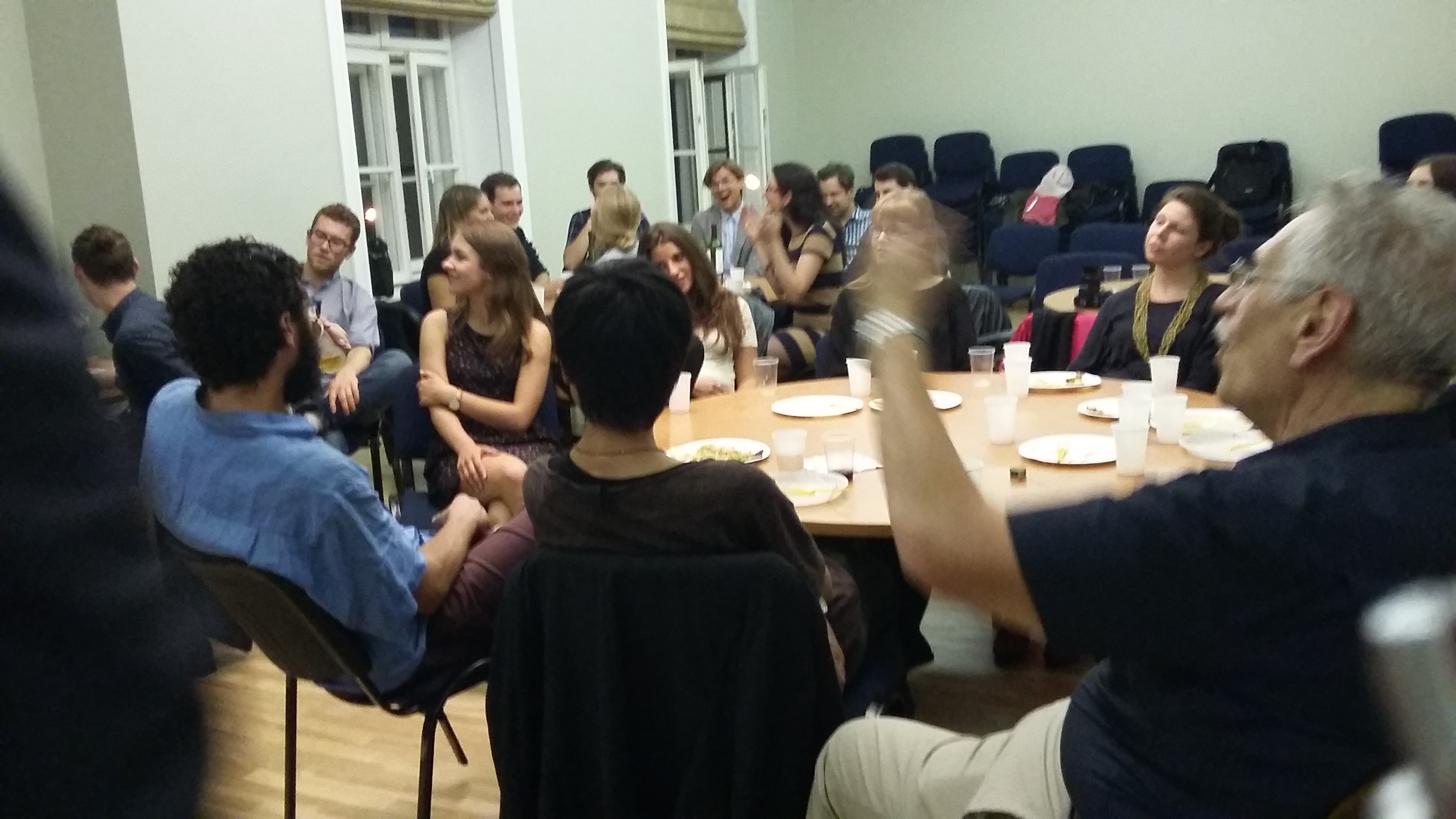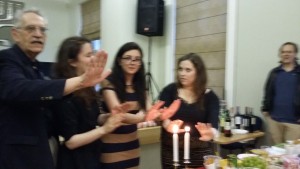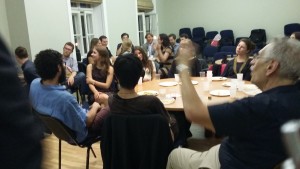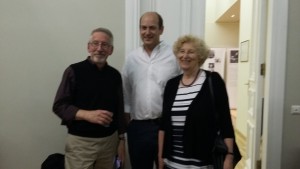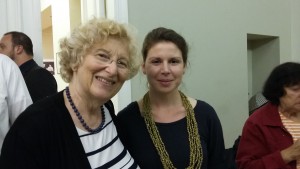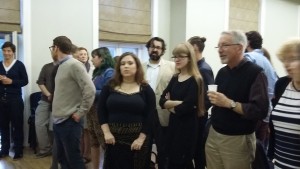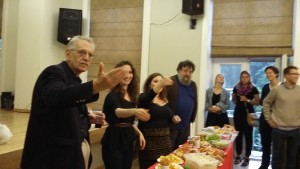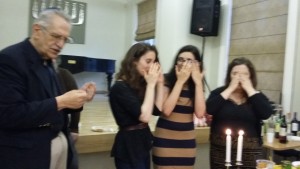As in earlier years, this year’s crop of Yiddish summer course students were invited to celebrate Sabbath at the Lithuanian Jewish Community. The event scheduled for the Friday of July 31 was joined by the Union of Lithuanian Jewish Students and became a potluck rather than a hosted dinner.
A Lithuanian girl named Aistė served as greeter and hostess, directing people with dishes, tupperware and bottles of wine to the tables in front of the stage in the White Hall on the third floor of the Community building. Aistė said she was taking the summer course even though she had no Jewish heritage at all in her family, but is simply fascinated with the language and culture of Yiddish. There was some confusion as to the scheduled start of the evening, either 8:30 P.M. or 9, but in the end that lent to the informality of the evening.
The traditional Sabbath blessing was given by VYI summer course teacher professor Abraham Lichtenbaum from Argentina with program head professor Dov-Ber Kerler lending assistance, after which the traditional challa bread was broken and passed around.
The food table featured a real variety of foods, from salmon and herring to an assortment of homemade salads and a variety of kashas.
In earlier years students from the summer course formed teams usually based on country of origin and performed songs, either in Yiddish or the language of their country. This year was no different, except that for the first time the Americans made a good showing, with some six or seven students giving a rousing rendition of “Home, Home on the Range” in Yiddish.
Other Yiddish songs seemed to pop up spontaneously, including the Partisan Hymn or Zog Nit Keynmol, Vilne Vilne and other standbys such as Bei Mir Bist Du Shein. The usually strong Polish-language contingent was not absent this year, but the Polish songs (with a slight Ukrainian accent it seemed) were clearly outnumbered by the Yiddish.
Besides the younger students there were a few “famous” guests who attended without much fanfare. These included the Ellen Cassedy, author of We Are Here: Memories of the Lithuanian Holocaust, and Shimon Samuels, the Paris-based director of international relations for the Simon Wiesenthal Center. Cassedy’s book is named after a line in the Yiddish song Zog Nit Keynmol, “Mir seinen do,” and she seemed to enjoy the song as it was sung in Vilnius on July 31. Dr. Samuels said he was only in town for a few days and more or less just dropped in to say hello. Other guests included local tourist guide Regina Koplevich who speaks Hebrew and leads tours of Jewish Vilna and other locations around the country, president of the Union of Lithuanian Jewish Students Amit Belaitė and LJC staff.
Professor Abraham Lichtenbaum told us about his family’s origins. He was born in Buenos Aires, Argentina, but his mother is from Odessa and his father from Warsaw. At home they spoke Spanish, and he calls Yiddish his “grandmother-tongue” because only she spoke Yiddish and reportedly even learned card games from reading Sholem Aleichem stories. Professor Lichtenbaum said he studied in Argentina and Israel, has been teaching for 50 years now and is known as an advocate of the Yiddish language. He said Vilnius is a nice place and he feels almost as if it were his hometown sometimes. “I would trade New York for Vilnius because I like it here, I love the people, I love the students and I love the Lithuanian weather. I have taught for five years in New York and for ten in Vilnius. There is a good atmosphere here and the students feel free, nobody is oppressing us. I teach upper-level Yiddish.” He introduced us to Karolina Szymaniak, his former student and now fellow teacher, born in Cracow resident in Warsaw.
Dr. Szymaniak recounted how she began studying Yiddish in Vilnius 15 years ago. She was an able student and acquired the language quickly. Now she teaches beginners. Szymaniak is assistant professor at the Jewish Historical Institute in Warsaw w here she heads the Yiddish Culture Unit. She is a researcher, editor, translator from Yiddish and English and a language instructor with a PhD in literary and cultural studies. Her research interests range include modern Jewish literatures and cultures, Polish-Jewish literary and cultural relations, the politics of memory, theories of modernism and of the avant-garde, women’s literature and translation studies, according to her webpage at academia.edu:
http://jhi.academia.edu/KarolinaSzymaniak
She has been visiting Vilnius for 15 years now and comes almost every summer.
When Ellen Cassedy visited Lithuania twelve years ago, she left knowing she would write a book about her experiences here. She came searching for her roots, and for more information about her uncle, who was a Jewish ghetto police officer in the Šiauliai (Shavl) ghetto. After listening to what Lithuanians had to say about the Holocaust, Cassedy commented she thought the country still hadn’t come to terms with its past, what she meant was that Lithuania had not finished coming to terms with the Jewish past and never should be finished, because we all must eternally question the events of the Holocaust and study the difficult lessons of the past. Ellen Cassedy is currently participating in the Yiddish summer course.
She spoke to us later and said:
“I’m enjoying my time in Vilnius. At the Vilnius Yiddish Institute Summer Program, we’re reading wonderful work by Sholem Aleichem, I. L. Peretz, Kadya Molodowsky, and other great writers. On Friday nights, we’ve enjoyed a shabes tish at the Community Center, with good food and drink and loud singing. I’ve given two lectures, about the Jewish history of Vilnius and about the Holocaust in Lithuania and how the country is engaging with its Jewish past. This is the theme of my book “We Are Here/Mes esame čia.” And I’ve found time to eat some Vilnius-baked bagels, too.”
German student Anna Wieshev told us how she became interested in Yiddish:
“I discovered the Yiddish language by accident when I went to Salzburg for master’s studies. I had studied philosophy and sociology, but for my master’s work I chose Jewish history, a subject about which I knew nothing at all. I was attracted by the unknown. As I went deeper into Jewish history, I had to learn Yiddish. From the first lessons I knew that a completely new, hitherto unknown to me world had opened up. I don’t have Jewish roots, but my uncle did marry an American Jewish woman and they used to visit us. I found it fascinating talking to them. Now I am beginning to get into Jewish history in Germany, but I still don’t understand enough to talk about it or answer questions about the Nazis and the Holocaust. People often ask me, somewhat surprised, why I study Jewish history if I am not a Jew. I find it strange to hear such a question, because it is natural to chose subjects which interest you.”
The Sabbath evening broke up after several hours with most of the younger people heading out for a night of karaoke at the Vilnius bar Brodvejus. Several students even performed in Yiddish to a seemingly somewhat baffled mainly Lithuanian crowd.
The VYI Yiddish Summer Course will run until August 14 this year.
In honor of the Americans’ great rendition of Heim afen Range at the Sabbath event, we invite you to listen to a humorous song from the America of more than 100 years ago now about Levi, the Yiddish cowboy, by Ed Meeker:


